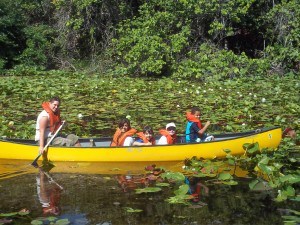 A summer camp counselor has many responsibilities when it comes to tending to the children. The biggest responsibility is making the children feel loved and accepted. Counselors have a duty to boost the children’s morale when activity time arises. Canoeing is one of the biggest activities in which children partake during the summer. It can be an enriching and delightful experience if all the children are prepared. However, fear of the unknown can sometimes place fear in their hearts. The following are seven tips that a counselor can use to prepare summer camp children for their first canoeing session:
A summer camp counselor has many responsibilities when it comes to tending to the children. The biggest responsibility is making the children feel loved and accepted. Counselors have a duty to boost the children’s morale when activity time arises. Canoeing is one of the biggest activities in which children partake during the summer. It can be an enriching and delightful experience if all the children are prepared. However, fear of the unknown can sometimes place fear in their hearts. The following are seven tips that a counselor can use to prepare summer camp children for their first canoeing session:
1. Establish Trust Through Experience
A counselor must give children a consistent emotionally balanced experience for them to trust him or her. Many children are nervous about their canoeing experience because they are unclear about their level of protection. Children grow up believing that their parents will protect them at all costs, but they may not feel safe with the camp counselor until they see a situation in which the counselor shows responsibility and compassion. For example, tending to an injury or a bug bite can establish a sense of trust between a summer camp child and a counselor.
2. Lead by Example
Leading by example is one of the best ways to convince children to venture out into the water or any other adventurous location. Children will not likely follow a counselor who is displaying signs of nervousness or confusion. A leading counselor will have to have a calm and confident demeanor at all times. If the counselor remains calm, he or she will create an environment of calmness.
3. Have a Kiddie Q and A Session
The camp counselor can have a question and answer session to get to the root of the children’s fears. Some children may fear drowning. Some children may think that the canoe will get lost in the rapids. Some children may be worried that they will not get to the bathroom on time if nature calls. The counselor should hold a meeting during which he or she addresses every concern no matter how obvious the answer may seem. The children are taking a huge step by going out on the trip. Addressing some of their concerns can ease their minds early in the process.
4. Share a Story to Which the Children Can Relate
Another trick that the counselor can try is sharing a story of conquering fear. The counselor can tell as story to the children about a time when he or she was afraid to try something new. It could be moving to a new city, taking a new job, getting on an airplane or something else. The counselor can go into detail about how he or she conquered those fears and was able to get through the experience. Explaining the positive outcome of the experience will help, as well.
5. Engage in Breathing Exercises
Breathing exercises can help to relax the children before the canoeing trip. The group can do breathing exercises to calm anxiety at any time and in any location. The counselor can practice other strategies with the children, as well. Examples of alternative anti-anxiety strategies are counting, drawing and listening to music. Calm music can calm the psyche as can the calm sounds of the ocean.
6. Give an In-Depth Explanation of the Safety Equipment
The camp counselor can take the approach of explaining to the children how the safety equipment works. Sometimes explaining the mechanics can help the children to realize that they will be safe even if they do by some change fall over. The counselor can explain the canoe’s precise architecture, how the oars work, and how the life jackets will keep them afloat even in the worst of circumstances. The counselor can go over some crucial safety tip that will keep the children in the canoe. Some effective safety are tips such as:
- Sit in the center of the canoe
- Avoid sudden jerks and quick movements
- Stay low while the canoe is moving
Announcing the safety tips will help reassure the children that they can participate in protecting themselves during the trip. It will give them confidence and a bit more strength.
7. Offer the Children Some Incentives
When all else fails, incentives will usually get children’s feet moving. The camp counselor can offer a wide variety of incentives depending on the children’s ages. Young children may be interested in winning toy cars or doll accessories if they return from the trip successfully. Teens may appreciate their favorite DVD or a movie ticket. People always accept monetary incentives, as well.
A camp counselor can ease into a canoeing trip by using the previously mentioned tips. The trip will most likely be a successful one if the counselor finds a way to use all of the tips before the big day.
